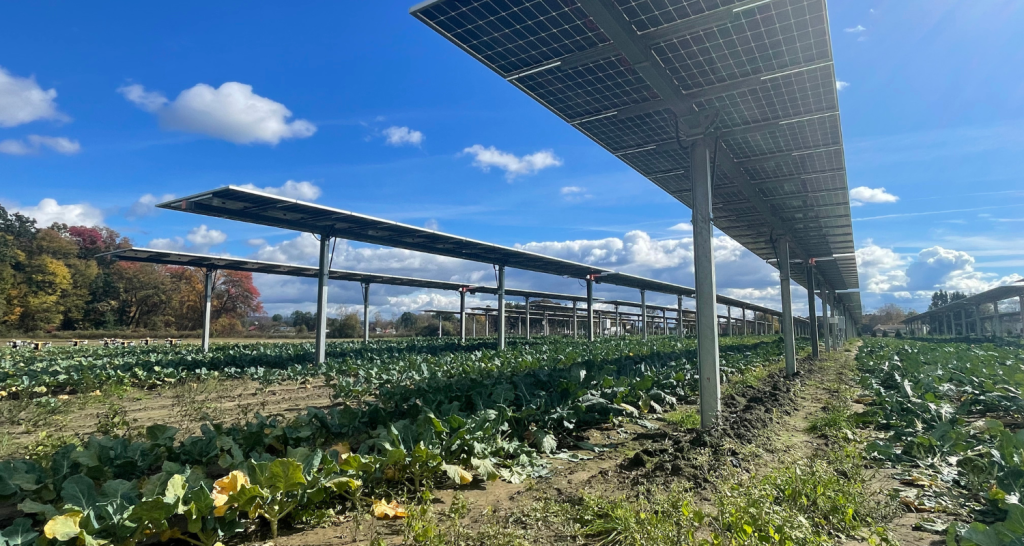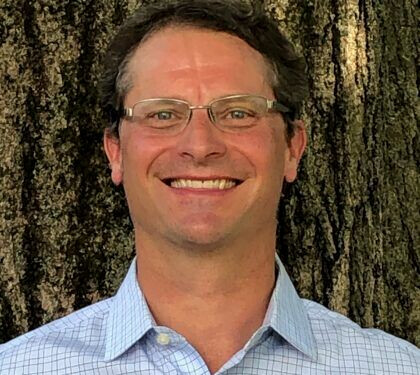An Uncommon Dialogue About Solar and Agriculture
Extreme weather and accelerating warming trends make clear the urgency to shift away from fossil fuels and decarbonize our energy sector. Solar energy generation is expanding rapidly and will have a central role in this energy transition, requiring millions of acres of land for utility-scale solar as well as millions of rooftops across the country.
In recent years, the conversation about utility solar development and its impact on America’s farms and ranches has mirrored the dialogue around housing and agricultural land: it’s impossible to do both in one place, and if you choose solar, it will take land out of agriculture permanently. While this is a concern — in fact, one of American Farmland Trust’s primary concerns — growing interest and technological advances in agriculturally compatible solar, known as “agrivoltaics,” are making it possible for renewable energy development and farming to exist together and even thrive side-by-side.
In order to advance this understanding among leading solar developers, environmentalists, farm groups, and tribal organizations, AFT engaged deeply in a stakeholder process convened by the Solar Energy Industries Association, The Nature Conservancy, and Stanford University. This effort to listen, learn, and lean in resulted in the recent Collaboration Agreement for Large Scale Solar Development: Climate, Conservation Community, a framework we hope will further cross-sector strategies to guide America’s solar future. Through this Uncommon Dialogue partnership, AFT brings an essential voice that champions clean energy, thriving farms, farmland protection, and the interests of rural communities. Our goal in taking a seat at this table is to ensure that America’s renewable energy future is built with Smart Solar℠ principles as a guide.
AFT is not an organization that preaches from the sidelines. We are engaging directly in solar project development that meets our Smart Solar criteria.
But this is only a piece of the strategic investments AFT is making to build a future where all communities can access affordable energy generated by America’s farmers and ranchers. With support from visionary funders and partners, AFT is building a national team of experts to tackle complex issues related to solar development, farm viability, and climate-smart agriculture. Our team of regional Smart Solar specialists is engaging solar industry leaders, farm groups, agrivoltaic researchers, and policymakers from New Jersey to California. This team will be leading AFT’s efforts to inform best practices, standards, and innovation to ensure that the solar buildout maximizes benefits for agricultural communities – after all, America needs clean energy as well as resilient, productive farms to sustain us all.
AFT is focused on the 2023 Farm Bill re-authorization as a key opportunity to advance Smart Solar principles at the federal level. Our platform of Farm Bill – Smart Solar recommendations urges Congress to direct and empower USDA agencies to provide the guidance, support, and leadership that will enable local decision-makers to put these principles into action. Specifically, AFT recommends that Congress direct USDA to develop guidance to ensure that land converted to solar can be returned to agricultural use, to position the Rural Energy for America Program (REAP) as a model for Smart Solar, and to invest in research on how best to incorporate solar into on-farm agricultural operations as well as on soil health, farmland trends, and multi-scale agrivoltaics.
AFT is not an organization that preaches from the sidelines. We are engaging directly in solar project development that meets our Smart Solar criteria. Beginning this year, AFT is working with leaders in solar through our Farmers Powering Communities(FPC) partnership to originate and produce 500 MW of community solar capacity over the next five years. We know this is ambitious – our team and partners are embracing the challenge to demonstrate that Smart Solar can be achieved at scale. By bringing together those working to feed the planet with those working to power America, FPC is helping ensure that solar development is deployed in a way that maximizes benefits to farmers as well as to low and moderate-income energy customers. Our initial market focus is on community solar projects in New York and Illinois. If you are a farmer or landowner in one of these states and would like to discuss an FPC opportunity for your land, please reach out to us today.
With Smart Solar, the future is bright.





